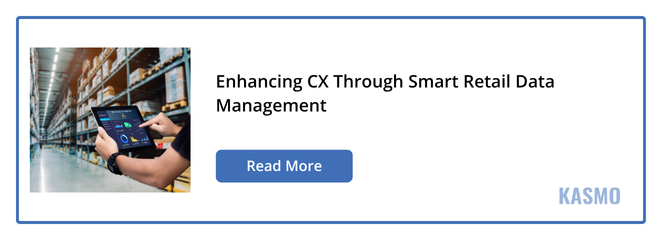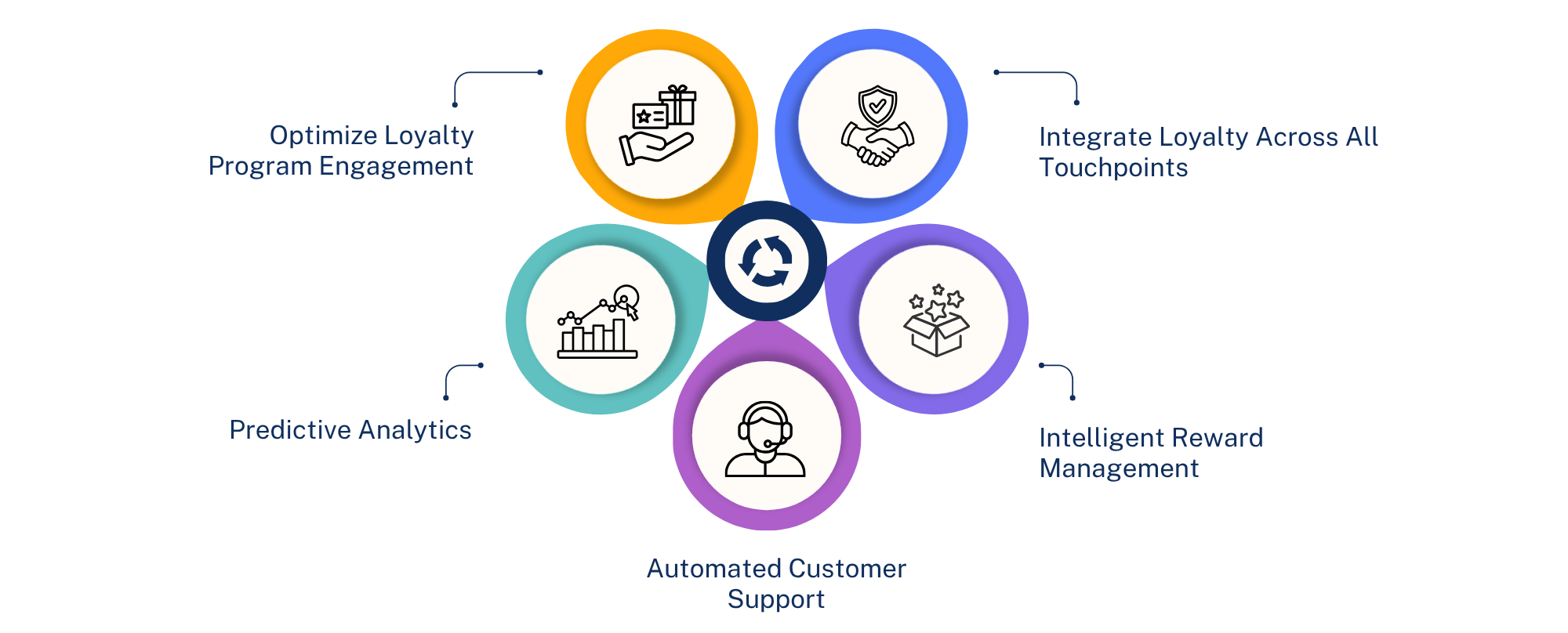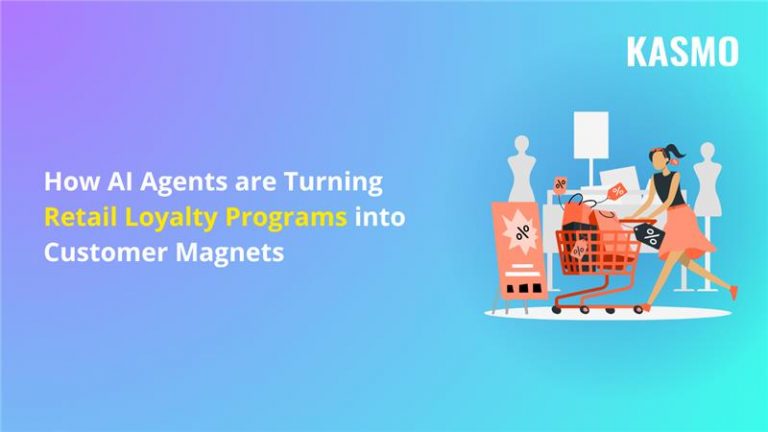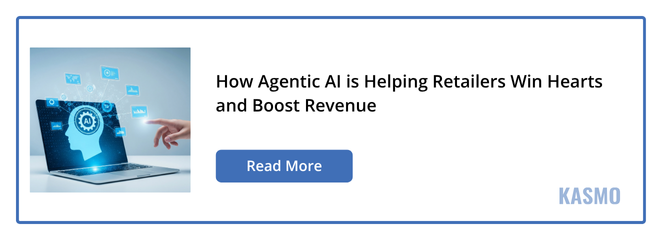Customer loyalty in retail is undergoing a major transformation. Modern shoppers are no longer motivated solely by discounts or reward points; they expect brands to recognize them, know their preferences, and create personalized experiences that feel genuine and rewarding. According to a Salesforce report, 32% of retailers admit they struggle in delivering personalized experiences in their loyalty programs. This shows a clear gap between expectations and execution.
To meet these evolving consumer expectations, the best option for retailers is to adopt AI agents. They combine real-time data analysis, predictive insights, and automated service tasks. This AI-driven loyalty program helps retailers understand what truly motivates each customer. They can deliver tailored rewards, anticipate churn, and create unified experiences across digital and in-store. This results in stronger emotional connections, higher engagement, and long-term loyalty that goes far beyond transactions.
This blog explores changes in retail loyalty programs, the role of AI Agents in meeting customer expectations, and how Salesforce Agentforce helps retailers to deliver personalization, automate tasks, and deepen customer loyalty.
How are Retail Loyalty Programs Changing?
The main motive of retail loyalty programs is to drive your customers back to make repeat purchases. But this can no longer be achieved through traditional approaches, as they only depend on frequency and spending to earn rewards. Whereas today’s shoppers’ needs have changed, only discounts don’t attract them. They value an emotional connection to the brand, which can be achieved through personalized communications, engaging experiences, and exclusive access. They expect brands to understand them, not just reward them. This shift is redefining how retailers design and deliver loyalty programs.
Shift to Emotional Engagement
Traditional customer loyalty programs revolve around points and perks. Modern consumers seek recognition, relevance, and value beyond purchase. Retailers need to change their focus from monetary rewards to building deep, meaningful connections with customers. Retailers can include interactive and gamified elements to make loyalty programs more engaging. Features such as instant-win games, badges, progress bars, and leaderboards encourage more frequent interaction with the brand. This helps to build emotional connections through tailored experiences, exclusive access, and meaningful interactions.
Shift to Data-Driven Strategies
Retail loyalty programs are evolving from simple point systems to data-driven strategies. The key driver of this transformation is unified data. As fragmented systems and siloed customer data make it difficult to deliver cohesive experiences, retailers need to use unified data platforms. This helps to integrate customer information from CRM, e-commerce, POS, and mobile apps. Rather than generic discounts, retailers can use unified data to gain real-time insights and offer rewards that are highly relevant to individual customer preferences.
 Personalization at Scale with AI
Personalization at Scale with AI
Personalization has become a non-negotiable aspect of loyalty programs. Customers expect brands to know what they want before asking. They want retailers to see them as individuals and provide personalized treatments and rewards. Retailers use advanced analytics and AI to process huge customer data, including purchase history, browsing behavior, and location, to create detailed customer profiles. AI also helps retailers to segment audiences dynamically, predict preferences, and serve the right offer at the right moment. This creates a sense of understanding, builds trust, and long-term loyalty.
Convenient Omnichannel Experience
Modern shopping is not restricted to a single platform, so customer loyalty programs must aim to provide consistent experiences on all platforms. Whether customers are browsing online, shopping in-store, or interacting through social media, building a unified experience is essential. Programs must offer easy tracking of rewards, flexible redemption options, and intuitive interactions across all channels (omnichannel) for a seamless experience. Integration with point-of-sale (POS) systems makes the process simple and easy to redeem rewards.
How AI Agents are Enhancing Retail Loyalty Programs?

Optimize Loyalty Program Engagement
Personalization has become a major aspect of modern loyalty programs. This requires a deeper understanding of customers and their needs. AI Agents analyze millions of customer interactions across different touchpoints to know what motivates engagement. AI agents use behavioral data like purchase history, browsing behavior, and campaign responses. This helps identify the right time and channel to connect with each customer.
Agents also respond to customer inquiries autonomously. These agents help teams design and refine promotions using data-driven insights. AI Agents can create hyper-personalized messages and reward campaigns by analyzing shopper behavior, point-of-sale (POS) data, and audience segments in real time. This level of precision makes it easier for customers to connect with your brand, boost acquisition, improve retention, and increase lifetime value.
Integrate Loyalty Across All Touchpoints
Consumers engage with brands that provide exclusive, personalized experiences at every touchpoint. They expect loyalty programs to follow them, from online stores and mobile apps to in-store experiences. Such programs create a sense of belonging and exclusivity that adds value to the shopping experience and differentiates you from others. AI Agents ensure this continuity by connecting every customer interaction into one unified journey.
Especially, this connection is essential to be synchronized between online and offline stores. AI Agents enable this integration by connecting data from CRM, POS, and inventory systems to create a consistent and context-aware experience. When a shopper walks into a store, the system already understands their preferences, purchase history, and loyalty status, allowing associates to provide tailored recommendations and offers. This not only strengthens brand trust but also turns every visit into an opportunity for engagement and reward. This helps to bridge the gap between digital and physical experiences to provide a better omnichannel shopping experience.
Predictive Analytics
AI Agents use predictive analytics to anticipate customer needs before they even express them. By analyzing purchase frequency, engagement trends, and product affinities, AI can uncover several insights. They can effectively forecast churn, redemption probability, and customer lifetime value to prioritize actions and resources. Knowing these hidden insights, retailers can implement strategies like tailored discounts or early access that regain engagement and build stronger emotional connections. They can also suggest the optimal next action for a specific customer, such as a service recovery gesture or a tier upgrade recommendation, to foster loyalty. It also helps retailers to optimize marketing spending, improve ROI, and ensure that loyalty campaigns deliver a measurable impact.
Intelligent Reward Management
Consumers get frustrated when loyalty programs are irrelevant, too complicated to understand or use, lack personalization, or are time-consuming. Salesforce report shows that Consumers’ top complaints about loyalty programs are that it takes too long to earn rewards (46%), the rewards aren’t worth it (38%), the benefits expire or arrive too late to use (34%), or that offers don’t match what they want to buy (30%). And 20% said the programs are too complicated to use. All these issues lead to poor customer experience and increase the churn rate.
Retailers can tackle these challenges effectively with AI-powered reward management. AI Agents bring intelligence and flexibility to reward management by continuously evaluating which incentives resonate most with different customer segments. AI agents automate reward management at each touch point, personalizing coupons and optimizing redemption options to enhance customer experience. So, retailers can create rewards that are timely, valuable, and aligned with customer expectations to turn loyalty into a genuine brand differentiator.
Automated Customer Support for Loyalty Queries
Retailers encounter a high volume of customer inquiries related to loyalty points, reward redemptions, and account details. Delays in response or a lack of proper support impact customer experience and reduce engagement with loyalty programs. With AI agents, retailers can automate several loyalty support processes. They provide instant, 24/7 support for inquiries about loyalty points, membership tiers, and recent purchases, to ensure that customers receive timely and accurate information.
AI agents can understand customer intent and context to deliver personalized responses across various channels that align with each shopper’s preferences and journey. This frees up time for human agents to handle more complex cases and high-value interactions. As a result, retailers can provide a smoother, more responsive post-purchase experience to keep loyalty program members engaged and connected after the initial sale.
How Agentforce Enhances Retail Loyalty Programs?
So far, we have explored the changing customer expectations from retail loyalty programs. Salesforce Agentforce helps to effectively address these pinpoints. It transforms loyalty program management by automating different processes using Salesforce’s unified data ecosystem. It generates campaign briefs, identifies and segments target audiences, designs personalized content, and maps complete customer journeys.
Agentforce continuously monitors KPIs and helps retailers with campaign optimizations, adjusting reward types, messaging, and timing to maximize engagement. Through predictive analysis, it suggests offers and promotions that resonate best with customers, provides AI-driven insights, and improves ROI.
Agentforce also empowers retail brands with seamless omnichannel engagement by integrating with Salesforce Marketing Cloud, Sales Cloud, and Service Cloud. This ensures loyalty offers are delivered across email, mobile, in-store, and web channels, providing a cohesive customer experience. Using Agentforce, retailers can automate and personalize loyalty programs, ensuring that each customer feels valued and understood.
Best Practices to Improve Retail Loyalty Programs
Rather than offering generic discounts, retailers can provide personalized and experiential rewards to customers. Unified data helps to offer rewards that are highly relevant to individual customer preferences.
Maintain transparency and show customers that their data is handled responsibly and that your program values honesty. Transparent practices strengthen relationships and encourage long-term engagement.
Implement effective data and AI strategies, collect, unify, and analyze customer data across all touchpoints to understand behavior and preferences. A strong data foundation ensures smarter, more personalized loyalty campaigns.
Continuously monitor program performance and adjust strategies based on real-time insights. Agile experimentation helps maximize engagement and drive faster returns.
Customer loyalty programs in the retail industry handle sensitive customer information. Auto-flagging suspicious transactions and verifying only when needed helps prevent fraud and maintain trust.
Conclusion
A successful loyalty program aims to build a genuine emotional bond between your brand and customers. It makes shoppers feel recognized, valued, and truly understood. To build such personalized programs, retailers need intelligence, automation, and agility, which is possible through AI Agents. They turn traditional reward systems into intelligent insights that nurture trust and drive repeat purchases.
With Agentforce, retailers can transform loyalty into lasting relationships. It helps brands predict customer needs, deliver meaningful rewards, and maintain consistent engagement across every touchpoint. So, AI Agents act as an effective tool for retailers to design loyalty programs that keep customers coming back repeatedly.




